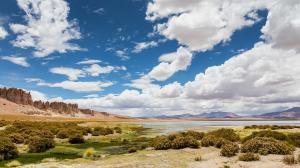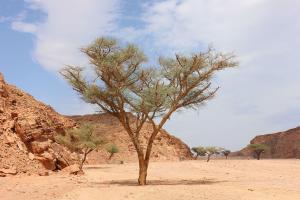 My family moved from Indiana in 1953 to Phoenix, AZ, during those days when “you sent your sinuses to Arizona.” For those of you not old enough to remember that particular ad campaign, it worked with us, for both my father and my older brother had difficulties with breathing, and the desert air of Phoenix was beneficial to both of them. Nearly 70 years ago, the city of Phoenix had barely 100,000 people in a huge “valley of the sun,” the municipality’s self-designation then and now. We moved to the then western edge of the city, beyond 23rd Avenue, near downtown now, but then outside the city limits. When we looked west from our house, we saw only desert, dotted with saguaro cactus, various sorts of brownish tumbling shrubs, and endless mounds of sand. Our view then is now subsumed by I-17 and a rush of cars and trucks, but then we heard only a few hardy birds, an occasional coyote howl, and the nightly scuttle of insects, out to feed and to try to escape the lizards that sought their own meals after the scorching desert sun had at last set. My old Phoenix house, in serious disrepair when last I saw it, has been swallowed by urban sprawl, lost among thousands of structures that have bloomed in that desert, displacing most of those coyotes and birds, though the insects have still found ways to survive and torment those humans who have barged into their territory.
My family moved from Indiana in 1953 to Phoenix, AZ, during those days when “you sent your sinuses to Arizona.” For those of you not old enough to remember that particular ad campaign, it worked with us, for both my father and my older brother had difficulties with breathing, and the desert air of Phoenix was beneficial to both of them. Nearly 70 years ago, the city of Phoenix had barely 100,000 people in a huge “valley of the sun,” the municipality’s self-designation then and now. We moved to the then western edge of the city, beyond 23rd Avenue, near downtown now, but then outside the city limits. When we looked west from our house, we saw only desert, dotted with saguaro cactus, various sorts of brownish tumbling shrubs, and endless mounds of sand. Our view then is now subsumed by I-17 and a rush of cars and trucks, but then we heard only a few hardy birds, an occasional coyote howl, and the nightly scuttle of insects, out to feed and to try to escape the lizards that sought their own meals after the scorching desert sun had at last set. My old Phoenix house, in serious disrepair when last I saw it, has been swallowed by urban sprawl, lost among thousands of structures that have bloomed in that desert, displacing most of those coyotes and birds, though the insects have still found ways to survive and torment those humans who have barged into their territory.
There is magic in the desert. There is stillness and quiet energy, strong creatures and a demanding sort of living that is not for everyone, but that contains a lure for others that see life rather differently than the increasing numbers of urbanites that populate our nation and planet. I grew up in the desert with its bone-chilling, dry winter cold and its boiling summer’s heat that is completely unimaginable to those who have only seen it on TV or in a movie. For them, it is a formidable place, a place not of lure but of terror, a place not drawing them in but driving them toward grass and water and trees. I admit that I could hardly wait to escape the desert, so I headed back to the Midwest for college, and then to Texas for seminary, graduate school, and almost the entire course of my academic life. Do not be fooled! Dallas is not the desert, but rather the high plains, a very different prospect than the desert. There is desert in Texas, but it is far west of Dallas.
I now live in Los Angeles, termed the high desert near the ocean, a Mediterranean place, but to this desert boy still hardly the desert that I know. Oh, there is cactus and sage, but there are also tall palms, bougainvillea, birds of paradise (the fabulous tropical plant, I mean), among a profusion of flowering grasses and shrubs that would hardly survive in the desert. No, Los Angeles is no kind of desert I know, though I do enjoy living here a good deal. Earlier this week, our LA family, son, his girl friend and his daughters, our granddaughters, high-tailed it to the real desert, about three hours east of here, a place called Borrega Springs. Now, there was the desert! Since it is late March, the temperatures were pleasant, the wind gusty, the sand blowing grandly, the buzzards cruising for a meal, the few birds still singing lustily from the rather sparse vegetation, the many mountains grand and glorious in their bald grandeur.
All six of us spent a part of one day traversing a local slot canyon, a vast array of boulders and hardened mud, molded and shaped over millennia by wind and flashing water into fantastic structures, some of which were so close together that a hefty human would find it impossible to squeeze through—hence the name slot. One might call it “fat man’s misery,” though that sort of name would be looked down on today, and for good reason. Even in late March, it was hot in the sun, and the six of us made what was billed as a brief hike into a much longer one because we made a wrong turn or two. Fortunately, our two grands, age 8 and 5 trooped on and only at the very end nearly gave out, along with the oldsters. Here was the desert, almost completely devoid of plant life, looking more like a moonscape than an earthly place, but thoroughly fascinating for all that. It reminded me somewhat of my several times in Israel, near the Dead Sea, and its blasted landscape and shimmering heat.
I thought of Jesus and his disciples, denizens of the desert, and how that desert had molded them into the people they were, hardened by a life that demanded strength and persistence, a life that needed to wait for any sort of fulfillment, any kind of ease and rest. I imagine those Roman soldiers who prowled the streets of Jerusalem, a city sited in the deserts of Judea, felt abandoned to a terrible fate, far from the riches and comforts of Rome and its fountains and markets and fleshpots. Little wonder that Pontius Pilate spent most of his time as governor of Judea not in dusty Jerusalem but in Caesarea by the Mediterranean with its sea breezes and free-flowing aqueduct. Pilate obviously cared little for the desert, nor did very many of his Roman friends and retainers.
But they soon had to deal with these desert dwellers, these hardened people of the sand, who made their Roman lives miserable and dangerous. The Romans had so much trouble with these desert people that during the final revolt against their oppressors, the Judeans lured a full four legions of Roman soldiers to suppress their unrest. And of course some years prior to that fateful year of 70CE, they had executed that rebellious man of the desert, Jesus, as the seditious and troublesome person that he appeared to be. That man had spent much time in the desert, tempted to become a man of power by the forces of evil, according to one story, lured to the desert for well over a month for contemplation and reflection according to another, finding in that desert a proper place for prayer and for fortification against the trials he felt certain he would face. The desert in part made that man a formidable opponent of any who would employ their supposed power to oppress and abuse others. The quiet and strengthening desert formed Jesus who then attempts to form us into strong towers against any and all oppressors, against any who would use hate to triumph over the weak.
There was then magic in the desert. There is now that same magic, but it is a subtle and sneaky magic, one that works its way into a life slowly and quietly, not with bursts of beauty and sound, but with a noiseless waft of wind, a soft song of bird. The desert makes towers of strength if we allow it to work its will. I am ever grateful for the desert, its vast spaces, its profound quiet, its relentless yet often hidden activities. It is good to be in the desert, and I urge you to find its unique riches for you. Its bracing wonders will have its way with you, if you open yourself fully to its magic.
(Images from Wikimedia Commons)











